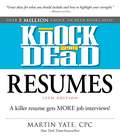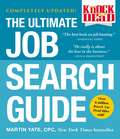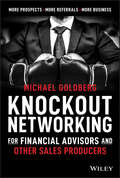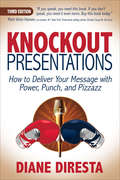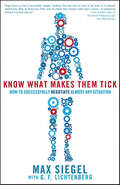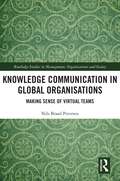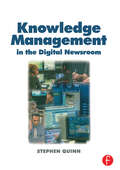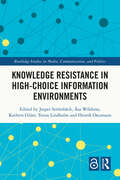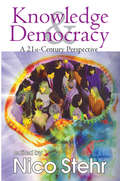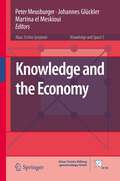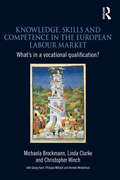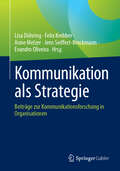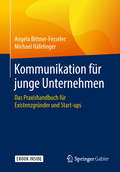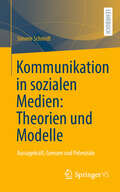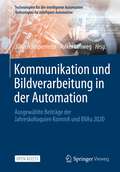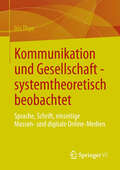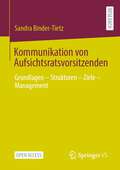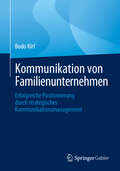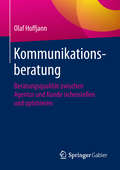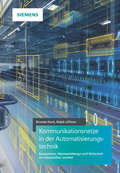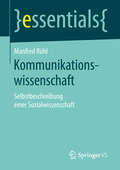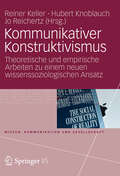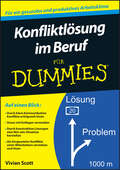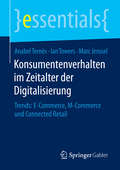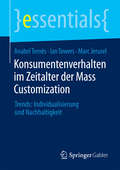- Table View
- List View
Knock 'em Dead Resumes: A Killer Resume Gets MORE Job Interviews! (Twelfth Edition)
by Martin Yate<p>Expert advice on building a resume to get the job you want! <p>Your resume is the most important financial document you'll ever create. When it works, so do you. Drawing on more than thirty years of experience, bestselling author Martin Yate shows you how to write a dynamic, effective resume that: <p> <li>Stands out in a resume database <li>Builds a strong personal brand employers will want on their team <li>Passes recruiters' six-second scan test <li>Speaks to exactly what employers are looking for</li> <p> <p>The new edition of this classic guide includes dozens of sample resumes as well as cutting-edge advice on resume-writing tactics. With <i>Knock 'em Dead Resumes</i>, 12th Edition, you'll grab employers' attention--and score the job you want.</p>
Knock 'em Dead: The Ultimate Job Search Guide (Knock 'em Dead Career Book Series)
by Martin YateCompletely updated with new material, this bestselling job search guide can help you keep up with changes in the job market—from updating the language of your resume to using social media networking to make professional connections that are essential in finding new employment opportunities.For more than thirty years, Martin Yate&’s Knock &’em Dead series has helped millions of people succeed in their job search and has continued to be one of the most powerful in the field, constantly meeting the challenges of the modern marketplace. In Knock &’em Dead, you&’ll learn to create a resume that works, build strong profession-relevant networks, and develop street-smart strategies for getting more interviews and learning how to turn those job interviews into job offers. More than a job-search guide, you&’ll have a blueprint for becoming more successful, while gaining the ability to control your professional destiny and your economic security. This unique book gives you a practical, thoughtful, and carefully integrated new approach to successful career management in an age of uncertainty. Rather than a series of canned answers, this book is your gold standard for job change, professional growth, and a successful and fulfilling life.
Knockout Networking for Financial Advisors and Other Sales Producers: More Prospects, More Referrals, More Business
by Michael Goldberg90% of financial advisors fail at being financial advisors. Why? Because advisors, brokers, reps, and agents need to see more people to make more sales appointments. And nobody in their firm, agency, branch, or shop trains them how! Knockout Networking for Financial Advisors is the only book written for sales producers in the financial services industry focused on making more connections through networking In the wake of the COVID 19 pandemic, networking, developing relationships, generating referrals, and making important connections are as important as ever. The ideas and approaches in Knock Out Networking for Financial Advisors can be applied immediately to virtual meetings, online networking groups, social media, podcasts, and of course, phone calls. The problem is, most advisors and sales producers are not born networkers; they develop the skills and confidence through education, training, practice, and having a positive attitude. Knockout Networking for Financial Advisors covers everything you need to know about going to the right places (virtual or not!), saying the right things, and meeting the right people―essential skills for a financial advisor or sales producer that's serious about making more and better connections! The result? More prospects, more referrals, and more business. Author Michael Goldberg is a networking specialist, speaker, trainer, author (and boxer!) focused on helping financial advisors, brokers, agents, reps, wholesalers, and other sales producers grow their business or practice through networking. In this "must read if you're a financial advisor" book, you will learn how to: Confidently meet and greet new people in business settings Further define your Target Market to establish more and better connections Deliver a "knockout" elevator speech (not a script!) Generate more prospects and referrals from current client base Establish important relationships generating more business opportunities Bottom line, networking is the most effective way to attract more prospects, more referrals, and more business to your corner. Remember—keep the left up!
Knockout Presentations: How to Deliver Your Message with Power, Punch, and Pizzazz
by Diane DiRestaCalled the Bible of Public speaking, Knockout Presentations is a &“seminar in a book&” that reduces fear and gives speakers the steps to craft and deliver a talk that will make them a knockout on the platform! It&’s the next best thing to having Diane DiResta there to teach in person. DiResta provides all the fundamentals without the fluff. Speakers learn what confidence looks like, sounds like, and how to speak the language of confidence, reduce preparation time, craft a compelling talk, size up an audience, overcome fear, and master questions and answers. The Dos and Don&’ts at the end of each chapter help speakers review and remember the principles even after putting them into practice. Speaking is the new competitive advantage and Knockout Presentations gives speakers tools and techniques, templates, and resources to improve their skills.
Know What Makes Them Tick: How to Successfully Negotiate Almost Any Situation
by G. F. Lichtenberg Max Siegel“Siegel shows us how to successfully navigate situations that may arise at work, in the home, or in personal relationships. More, he shows how, if the cards are played right, everyone walks away a winner—an empowering feeling if ever there was one.” — Chris Gardner, author of The Pursuit of Happyness and Start Where You Are “Winners attract winners and smart leaders attract smart followers…. If you want to grow both personally and professionally, then join the winners and leaders who find wisdom with Max Siegel." — Chuck Wielgus, CEO of USA Swimming From highly innovative and successful business executive Max Siegel comes a straightforward and original self-help book that will give readers the upper hand in almost any kind of negotiation process.
Knowledge Communication in Global Organisations: Making Sense of Virtual Teams (Routledge Studies in Management, Organizations and Society)
by Nils Braad PetersenWhile organisations become more and more global, they also become more and more dispersed and virtual. This challenges the sense of a shared organisational identity and the ability of employees to communicate personally held knowledge. To address these challenges this book offers an innovative multidisciplinary approach to knowledge communication in global organisations. The book develops a multidisciplinary analytical lens through which to understand employee identity formations and knowledge communication practises. Using detailed analyses of interviews from a real organisation, the book builds an understanding of how 21st century employees make sense of a virtual organisational reality characterised by multiple simultaneous projects and virtual, dispersed teams. These analyses are conducted using a new discourse analysis method for analysing research interviews, Discursive Sensemaking Analysis. Using these methods and findings, researchers, project managers and HR professionals will be able to analyse their own organisations to discover how employees make sense of the complexity of 21st century global organisations.
Knowledge Management in the Digital Newsroom
by Stephen QuinnIf you are an editor or newsroom manager seeking new and more efficient ways of managing the ever increasing flow of information through your newsroom, this book will provide the information you need to make informed decisions about crucial organisational and equipment changes. Case studies from newsrooms worldwide are used to present an overview of the information management tools and processes that are available to help journalists and media executives deal with information. Answers are suggested for some of the most pressing issues, including:What are the factors driving change in newsrooms?How are news organizations around the world re-organising their newsrooms to deal with information in new ways?How are the opposing needs to cut costs and yet maintain journalistic quality being met?What digital tools are currently available, e.g. for computer-assisted reporting?How can reporters become more mobile?How can trainee journalists be better prepared for operating within the changing newsroom environment?Each chapter is supplemented by a 'how to learn more' section, suggesting further resources for tackling each issue. Whether you are planning major change in your newsroom or simply wish to keep up with the latest industry trends, this is the book you have been waiting for.
Knowledge Resistance in High-Choice Information Environments (Routledge Studies in Media, Communication, and Politics)
by Jesper StrömbäckThis book offers a truly interdisciplinary exploration of our patterns of engagement with politics, news, and information in current high-choice information environments. Putting forth the notion that high-choice information environments may contribute to increasing misperceptions and knowledge resistance rather than greater public knowledge, the book offers insights into the processes that influence the supply of misinformation and factors influencing how and why people expose themselves to and process information that may support or contradict their beliefs and attitudes. A team of authors from across a range of disciplines address the phenomena of knowledge resistance and its causes and consequences at the macro- as well as the micro-level. The chapters take a philosophical look at the notion of knowledge resistance, before moving on to discuss issues such as misinformation and fake news, psychological mechanisms such as motivated reasoning in processes of selective exposure and attention, how people respond to evidence and fact-checking, the role of political partisanship, political polarization over factual beliefs, and how knowledge resistance might be counteracted. This book will have a broad appeal to scholars and students interested in knowledge resistance, primarily within philosophy, psychology, media and communication, and political science, as well as journalists and policymakers. The Open Access version of this book, available at www.taylorfrancis.com, has been made available under a Creative Commons Attribution-Non Commercial-No Derivatives 4.0 license.
Knowledge and Democracy: A 21st Century Perspective
by Nico StehrThe relationship of knowledge and liberties in modern societies presents a multitude of fascinating issues that deserve to be explored more systematically. The production of knowledge is dynamic, and the conditions and practice of freedom is undergoing transformation. These changes ensure that the linkages between liberty and knowledge are always subject to changes. In the past, the connection between scientific knowledge, democracy, and emancipation seemed self-evident. More recently, the close linkage between democracy and knowledge has been viewed with skepticism. This volume explores the relationship between knowledge and democracy, Do they support each other, do they mutually depend on each other, or are they perhaps even in conflict with each other? Does knowledge increase the freedom to act? If additional knowledge contributes to individual and social well being, does it also enhance freedoms? Knowledge and Democracy focuses on the interpenetration of knowledge, freedom and democracy, and does so from various perspectives, theoretical as well as practical. Modern societies are transforming themselves into knowledge societies. This has a fundamental impact on political systems and the relationship of citizens to large social institutions. The contributors to this book systemically explore whether, and in what ways, these modern-day changes and developments are connected to expansion of the capacities of individual citizens to act. They focus on the interrelation of democracy and knowledge, and the role of democratic institutions, as well as on the knowledge and social conduct of actors within democratic institutions. In the process of investigation, they arrive at a new platform for future research and theory, one that is sensitive to present-day societal conflicts, cleavages, and transformations generated by new knowledge. In this way, this volume will attract the interest of political scientists, sociologists, economists and students within various disciplines.
Knowledge and the Economy
by Johannes Glückler Martina El Meskioui Peter MeusburgerThe broad spectrum of topics surrounding what is termed the 'knowledge economy' has attracted increasing attention from the scientific community in recent years. The nature of knowledge-intensive industries, the spatiality of knowledge, the role of proximity and distance in generating functional knowledge, the transfer of knowledge via networks, and the complex interplay between knowledge, location and economic development are all live academic issues. This book, the fifth volume in Springer's Knowledge and Space series, focuses on the last of these: the multiple relationships between knowledge, the economy, and space. It reflects the conceptual and methodological multidisciplinarity emerging from this scholarship, yet where there has up to now been a notable lack of communication between some of the contributing disciplines, resulting in lexical and other confusions, this volume brings concord and to foster interdisciplinarity. These complications have been especially evident in our understanding of the spatiality of knowledge, the part that spatial contexts play in knowledge creation and diffusion, and the relevance of face-to-face contacts, all of which are addressed in these pages. The material here is grouped into four sections--knowledge creation and economy, knowledge and economic development, knowledge and networks, and knowledge and clusters. It assembles new concepts and original empirical research from geography, economics, sociology, international business relations, and management. The book addresses a varied audience interested in the historical and spatial foundations of the knowledge economy and is intended to bridge some of the gaps between the differing approaches to research on knowledge, the economy, and space.
Knowledge, Skills and Competence in the European Labour Market: What’s in a Vocational Qualification?
by Christopher Winch Linda Clarke Michaela BrockmannFor the free movement of labour across the European Union, establishing transparency and comparability of qualifications across member states is vital. This book examines how qualifications, knowledge, skills and competences are understood in different national contexts and trans-nationally and reveals a complex picture of differences and similarities both within and between countries. Against the background of EU policy initiatives, and in particular the European Qualifications Framework, an important focus is on the prospects and difficulties of establishing cross-national recognition of qualifications. Drawing on case studies of particular sectors and occupations in England, France, Germany and the Netherlands, this insightful book, written by leading academics in the field, will be a vital resource for students and researchers involved with vocational education and training, continuing professional development, human resource management and European Union policy.
Kommunikation als Strategie: Beiträge zur Kommunikationsforschung in Organisationen
by Felix Krebber Lisa Dühring Evandro Oliveira Jens Seiffert-Brockmann Anne MelzerIn diesem Buch geben renommierte Expert*innen aus dem Feld der strategischen Kommunikationsforschung und -praxis aktuelle, interdisziplinäre Einblicke in die Strategien der Unternehmenskommunikation. Sie erläutern, wie Kommunikationsforschung eine Brücke zwischen den theoretischen Erkenntnissen der Sozial- und Wirtschaftswissenschaften und ihrer praktischen Anwendung in Organisationen schafft. Denn Kommunikation muss in einem komplexen sozialen Umfeld bestmöglich gestaltet und eingesetzt werden, um konkrete Organisationsziele zu erreichen.Beitragsautor*innen aus dem In- und Ausland zeigen auf, wie der Theorie-Praxis-Transfer gelingen kann und widmen sich u.a. diesen aktuellen Themen: Nachhaltigkeitskommunikation, Start-up-Kommunikation, Datenkompetenz, Stakeholdermanagement, Globaler Kommunikation oder Kommunikationscontrolling.
Kommunikation für junge Unternehmen
by Angela Bittner-Fesseler Michael HäfelingerStart-ups und Existenzgründungen sind keine Miniaturausgaben großer Konzerne – ihre Entwicklung unterliegt eigenen Logiken. Dieser Praxisratgeber zeigt, wie effektive Kommunikation den Unternehmensaufbau und das Wachstum erfolgreich begleitet: Gründer und Entrepreneure erfahren, wie sie ihre Produkte und ihr Unternehmen in den verschiedenen Entwicklungsphasen zielgruppengenau kommunizieren können und wie es gelingt, Botschaften für Stakeholder relevant aufzubereiten – von der Idee über die Konzeption und den Markteintritt bis hin zur Etablierung.Viele anschauliche Modelle, Beispiele, Best Cases sowie wertvolle Interviews mit Branchenexperten bieten fundiertes Wissen und handfeste Empfehlungen für alle relevanten Handlungsfelder der Unternehmenskommunikation. Zahlreiche direkt umsetzbare Bausteine und das neu entwickelte Communication Canvas helfen dabei, den optimalen Kommunikationsmix für das eigene Unternehmen zu planen und zu gestalten.
Kommunikation in sozialen Medien: Aussagekraft, Grenzen und Potenziale
by Simone SchmidtIn diesem Lehrbuch werden zentrale und klassische Kommunikationsmodelle vorgestellt, die für das Medien- und Kommunikationsmanagement relevant sind. Ausgewählte Modelle und Theorien werden an die Social-Media-Kommunikation jeweils weiterentwickelt und angepasst, um die Aussagekraft, Grenzen und Potenziale für Aktivitäten in den sozialen Medien auszuloten.
Kommunikation und Bildverarbeitung in der Automation: Ausgewählte Beiträge der Jahreskolloquien KommA und BVAu 2020 (Technologien für die intelligente Automation #14)
by Jürgen Jasperneite Volker LohwegIn diesem Open Access-Tagungsband sind die besten Beiträge des 11. Jahreskolloquiums "Kommunikation in der Automation" (KommA 2020) und des 7. Jahreskolloquiums "Bildverarbeitung in der Automation" (BVAu 2020) enthalten. Die Kolloquien fanden am 28. und 29. Oktober 2020 statt und wurden erstmalig als digitale Webveranstaltung auf dem Innovation Campus Lemgo organisiert.Die vorgestellten neuesten Forschungsergebnisse auf den Gebieten der industriellen Kommunikationstechnik und Bildverarbeitung erweitern den aktuellen Stand der Forschung und Technik. Die in den Beiträgen enthaltenen anschauliche Anwendungsbeispiele aus dem Bereich der Automation setzen die Ergebnisse in den direkten Anwendungsbezug.
Kommunikation und Gesellschaft - systemtheoretisch beobachtet: Sprache, Schrift, einseitige Massen- und digitale Online-Medien
by Iris ThyeDieses Buch setzt sich in wissenschaftlicher Exegese mit dem von Niklas Luhmann konstituierten systemtheoretischen Begriff der Kommunikation auseinander. Eine evolutionär angelegte Analyse der verschiedenen Kommunikationsmedien folgt der begriffstechnisch präparierten Leitfrage, welche Veränderungen Sprache, Schrift, einseitige Massen- und digitale Online-Medien bei den drei basalen Komponenten der Kommunikation - Information, Mitteilung, Verstehen - bewirken. Wenn Kommunikation mit Luhmann als die grundlegende soziale Operation zu verstehen ist, die Gesellschaft allererst konstituiert, dann lässt sich zeigen, dass insbesondere technisch bedingte Umwälzungen in der Kommunikation - Buchdruck, elektronische Medien, Web 2.0 - bahnbrechende Veränderungen in der Gesellschaft, ihren Strukturen und Semantiken begünstigen und vorantreiben.
Kommunikation von Aufsichtsratsvorsitzenden: Grundlagen – Strukturen – Ziele – Management
by Sandra Binder-TietzIn diesem Open-Access-Buch präsentiert Sandra Binder-Tietz eine umfassende Analyse der Kommunikation von Aufsichtsratsvorsitzenden börsennotierter Unternehmen. Deren komplexe kommunikative Rolle wird dabei erstmals systematisch erschlossen. Aus der externen Perspektive werden die vielschichtigen Anforderungen der relevanten Stakeholder wie Investoren, Aktionärsschützer, Stimmrechtsberater und Journalisten an die Kommunikation aufgezeigt. Aus der internen Perspektive von Aufsichtsratsvorsitzenden, Investor-Relations- und Public-Relations-Verantwortlichen werden die internen und externen Kommunikationsmaßnahmen von Aufsichtsratsvorsitzenden identifiziert. Auf dieser Basis wird die Notwendigkeit begründet, warum und wie die Kommunikation zu einem festen Bestandteil des Kommunikationsmanagements von Unternehmen werden sollte. Für Forschung und Praxis werden dafür Implikationen und Empfehlungen entwickelt, wie eine erfolgreiche Kommunikation von Aufsichtsratsvorsitzenden aussehen kann.
Kommunikation von Familienunternehmen: Erfolgreiche Positionierung durch strategisches Kommunikationsmanagement
by Bodo KirfDieses Buch erklärt, was Familienunternehmen in ihrer Unternehmenskommunikation beachten müssen, um einen gelungenen Gesamtauftritt zu erzielen und alle relevanten Stakeholder wirkungsvoll anzusprechen. Familienunternehmen unterliegen als Organisationsform besonderen Merkmalen, Anforderungen und Spielregeln, die unterschiedliche Kommunikationskulturen und Inszenierungsstile bestimmen können. Der Autor erläutert, was Verantwortliche in Familienunternehmen in der Gestaltung ihrer Kommunikationsarbeit beachten sollten und welche Konzepte, Strategien und Maßnahmen intern sowie extern erfolgreich sein können. Er beschreibt, wie PR-orientiertes Storytelling in diesem Kontext funktioniert, wie ein Reputationsplus Familienunternehmen in ihren Kommunikationsauftritten vom Wettbewerb differenzieren kann und wie sie sich, gerade in schwierigen Zeiten von Krisen und Transformationen, unter medialisierten Kommunikationsbedingungen in Markt und Gesellschaft effektiv positionieren können. Zudem werden Kernerkenntnisse aus einer stichprobenartigen Befragung von Top-Managern aufgeführt, die ihrerseits unterschiedliche Erfahrungen in der Kommunikationsrealität von Unternehmen in Familienbesitz sammeln konnten.
Kommunikationsberatung: Beratungsqualität zwischen Agentur und Kunde sicherstellen und optimieren
by Olaf HoffjannDieses Buch erklärt, wie Kommunikationsberater und ihre Kunden die Qualität ihrer Zusammenarbeit sicherstellen und langfristig optimieren können. Der Autor beschreibt wissenschaftlich fundiert, anknüpfend an das systemische Beratungsverständnis, wie eine nachhaltig stabile Beziehung zwischen Kommunikationsberatern und Kunden entstehen kann: vom Prozess, über verschiedene Beratungsformen bis hin zur konkreten Umsetzung. Er erklärt, was zu viel Nähe, aber auch zu viel Distanz zwischen den Parteien mit sich bringt, wie das optimale Setting aussehen sollte und wo mögliche blinde Flecken lauern.Ein Buch, das Berater und Kunden dazu einlädt, ihre Rolle und ihr Handeln zu reflektieren und anzupassen, um so gemeinsam zu besseren Ergebnissen zu kommen.
Kommunikationsnetze in der Automatisierungstechnik: Bussysteme, Netzwerkdesign und Sicherheit im industriellen Umfeld
by Ricarda Koch Ralph LüftnerDas Buch vermittelt die Grundlagen für den Einsatz von Industrial Ethernet und Kommunikationsbussen in der Industrieautomatisierung. Es beginnt mit einer Einführung in verschiedene Feldbussysteme, in Ethernet mit seinen unterschiedlichen Ausprägungen sowie den Aufbau und die Protokollarchitektur von TCP/IP. Es folgen Abschnitte zu Wireless-Netzwerken und zu Protokollen zur Steigerung der Netzwerkverfügbarkeit sowie eine grundlegende Einführung in PROFINET. Praxisbeispiele zeigen die Konfiguration von PROFINET-IO-Netzwerken, MRP-Ringen, Shared Devices und I-Devices mit STEP 7 V5.6 und TIA Portal V15. Im Kapitel zu Industrial Security erläutert das Buch Angriffstechniken und Maßnahmen, Konzepte und Architekturen zur Netzwerksicherheit. Firewall-Beispielkonfigurationen mit dem TIA Portal V15 und SCALANCE S geben eine Hilfestellung für eigene Projekte. Das folgende Kapitel zeigt, wie ein industrielles Netzwerk in der Praxis strukturiert ist und welche Komponenten man dabei nutzen kann. Ein Ausblick zu Digital Connectivity und dem industriellen Internet der Dinge (IIoT) rundet das Buch ab. Inhalt Einführung in Kommunikationsnetze: PROFIBUS, AS-Interface, CAN-Bus, Ethernet, TCP/IP, WLAN, Netzwerkverfügbarkeit PROFINET: Funktionsprinzip, Real-Time-Konzept, Konfiguration, MRP, Shared Device, I-Device, Beispielkonfigurationen mit STEP 7 und TIA Portal Industrial Security: Angriffstechniken und Täterprofile, Anlagensicherheit, Netzwerksicherheit, Systemintegrität, Security-Beispielkonfigurationen mit dem TIA Portal V15 und SCALANCE Komponenten und Netzwerke:SCALANCE, Aufbau und Struktur industrieller Netzwerke Ausblick: Auf dem Weg zur Digital Connectivity
Kommunikationswissenschaft: Selbstbeschreibung einer Sozialwissenschaft (essentials)
by Manfred RühlEine Theorie der Kommunikationswissenschaft als Funktionssystem der Weltgesellschaft gibt es bisher nicht. Neu ist die Unterscheidung und die Synthese der sechs Kommunikationskomponenten Sinn, Information, Thema, Mitteilung, Gedächtnis und Verstehen, die Kommunikation unter mitweltbedingten Einschränkungen ermöglichen. Für die Funktion, die Kommunikationswissenschaft von anderen Funktionssystemen der Weltgesellschaft unterscheidet, wird das Erneuern bewahrten Kommunikationswissens vorgeschlagen.
Kommunikativer Konstruktivismus
by Hubert Knoblauch Jo Reichertz Reiner KellerDie Welt wartet nicht dort draußen darauf, entdeckt zu werden, sondern wir schaffen sie Tag für Tag neu - und zwar vor allem mittels kommunikativen Handelns. Deshalb ändert sich die Wirklichkeit tagtäglich und mit ihr auch die soziale Ordnung und die Normen und Werte, die unserem Handeln Bedeutung verleihen. Das ist die Grundposition des hier vorgestellten Kommunikativen Konstruktivismus. Die versammelten Beiträge versuchen zum einen, den Ansatz des kommunikativen Konstruktivismus theoretisch zu begründen. Zum zweiten wird der Ansatz in empirischen Arbeiten umgesetzt, die sich mit den unterschiedlichen Themen in verschiedenen soziologischen Teildisziplinen (Wissenschaftssoziologie, Migrationssoziologie, Mediensoziologie) beschäftigen. Zum dritten beinhaltet der Band Arbeiten, die Anschlüsse zu anderen Disziplinen herstellen, wie etwa zu der Stadt- und Regionalplanung, der Organisationsforschung und der Kommunikationswissenschaft.
Konfliktlösung im Beruf für Dummies (Für Dummies)
by Vivian ScottKonflikte erkennen, lösen oder von vornherein vermeiden Konflikte treten unweigerlich im Berufsleben auf – ob Sie anderer Meinung als Ihr Chef oder Ihre Mitarbeiter sind oder mit einem Kollegen aneinandergeraten. Dieses Buch gibt Hilfe zur Selbsthilfe bei der Lösung dieser Konflikte. Die Autorin zeigt, wie Sie Konflikte mit Ihren Kollegen oder als Vorgesetzter zwischen Mitarbeitern verstehen, entschärfen und im besten Fall lösen. Sie erfahren, wie Sie sich selbst und andere bewusst wahrnehmen, klar kommunizieren und im Gespräch auf die Bedürfnisse Ihres Gegenübers eingehen. So finden Sie Lösungen, die die Belange aller berücksichtigen. Sollte das nicht möglich sein, wird auch aufgezeigt, wie Sie Konflikte mit einem Mediator lösen können.
Konsumentenverhalten im Zeitalter der Digitalisierung: Trends: E-Commerce, M-Commerce und Connected Retail (essentials)
by Anabel Ternès Ian Towers Marc JeruselAnabel Ternès, Ian Towers und Marc Jerusel widmen sich der Frage, welche Konsummuster den Privatkonsum im Deutschland der kommenden zehn Jahren verändern werden. Dabei wird auf bereits absehbare Konsumtrends wie zum Beispiel E- und M-Commerce sowie Connected Retail Bezug genommen. Im Vordergrund stehen die Auswirkungen der Digitalisierung auf den stationären Handel und die Konsumenten. Die AutorInnen stellen u. a. dar, dass eine der zentralen Herausforderungen darin liegen wird, sich der Digitalisierung proaktiv zu stellen, um das Konsumerlebnis der Verbraucher zu verbessern. Doch auch die Grenzen des Onlinehandels werden aufgezeigt.
Konsumentenverhalten im Zeitalter der Mass Customization: Trends: Individualisierung und Nachhaltigkeit (essentials)
by Anabel Ternès Ian Towers Marc JeruselAnabel Ternès, Ian Towers und Marc Jerusel gehen der Frage nach, welche neuen Konsummuster sich aufbauend auf den Begriffen Individualisierung und Nachhaltigkeit herausbilden könnten. Denn der Trend nach nachhaltigen und individualisierten Produkten ist bereits seit mehreren Jahren spürbar, gilt jedoch weiterhin als Trend für den Privatkonsum der kommenden Jahre. Im Bereich Individualisierung erläutern die AutorInnen dafür zum Beispiel das Produktionsprinzip der Mass Customization. Nachhaltig Denkende versuchen dagegen, bewusste Konsumentscheidungen zu treffen.
